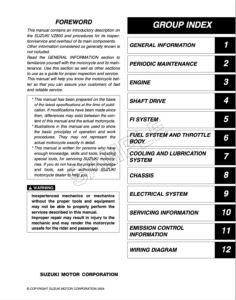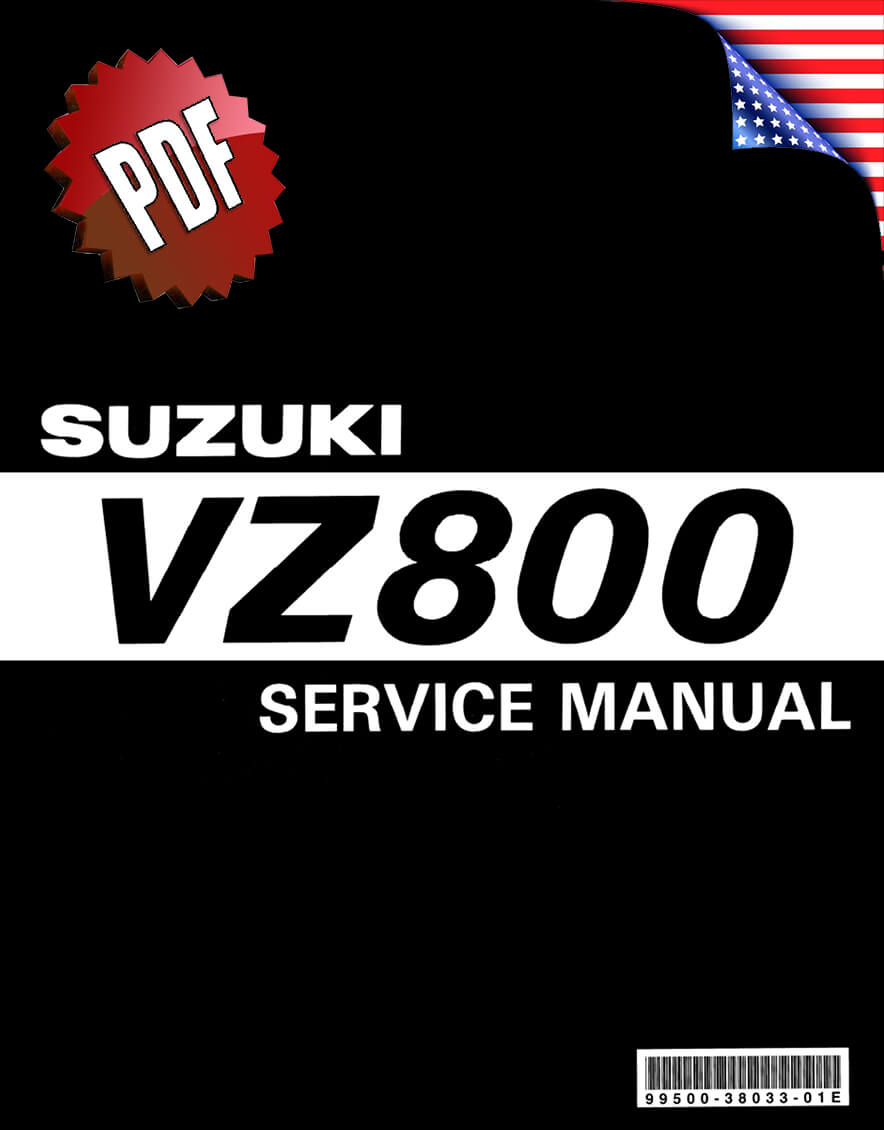Complete PDF version of the Service Manual for the Suzuki VZ800 Intruder M800 Boulevard M50. A MUST for every Boulevard M50 owner.
Download: Immediately after payment!
OEM Original factory workshop manual.
Models covered by this manual: 2005 to 2009
Number of pages: 454 pages
Table of contents:

This PDF repair manual can be downloaded right after the payment process in complete, on the device of your choice.
We do not offer printed manuals, for the following reasons:
- it is more eco-friendly to use a digital version
- your manual never gets dirty or greasy
- you can always choose to print the specific page(s) you need to work on your bike
- you receive your manual immediately after payment
- it is searchable

Suzuki VZ800
Suzuki Motor Corporation‘s Boulevard M50, also known as the Intruder M800 outside of North America, is a V-twin engine cruiser motorcycle. VZ800 is the global model number (from 2005, before 2005 VZ800 was the model number for the Marauder 800 which was a significantly different model). It is based on the well-known VL800 C50, with the letter C standing for ‘classic.’ The VL800 C50 was formerly known as the VL800 Intruder Volusia, but it was eventually abbreviated to Volusia. Its design is based on the first generation VZ800 Marauder. When Suzuki replaced the carburetors with fuel injection in 2005, the marketing name was modified once more, with M standing for ‘muscle’ and 50 signifying the engine displacement in cubic inches. Following the naming pattern for Suzuki cruisers outside of North America, the Intruder M800 alludes to the 800 cubic cm engine.
The M50 was built on the C50 frame and rear swingarm, which is a softail with a hidden single shock absorber, as opposed to the Marauder’s standard swingarm with two exposed shock absorbers. The M50 had different fenders and a different fuel tank from the C50, as well as a handlebar-mounted speedometer cluster and inverted 41mm forks, to give it a more muscular appearance than its C50 half-sister. The basic M50 engine was somewhat changed, with the chrome present on the C50 engine replaced with black paint. Internally, the engine gained split crank bearings rather than the C50’s one-piece bearings, as well as significantly redesigned valvetrain components that needed cylinder head adjustments. The power output is the same as the C50 power unit, and they both displace 805 cc. Both variants share a 5-speed transmission housed in the same crankcase as the engine, as well as a wet clutch, water cooling, a single front disc brake, and a rod-operated rear drum brake.
The M50 had unusual style, including a unique rear fender, LED taillight, black coated mag wheels, and an aggressive posture. Other minor variations between the M50 and the C50 include different front brake disc designs (although the same size), a slightly harsher suspension on the M50, and a different tool box/faux air cleaner. The model garnered positive feedback from the motorcycling press, with Motorcycle Cruiser Magazine praising it for its comfort and passenger carrying capability. However, several critics complained that the M50 lacked the power to back up its powerful appearance. The model was not a best-seller, thus Suzuki completely revamped it after five model years.
The M50 was completely redesigned in 2010. The M50 motor was retired, and the current model M50 now utilizes the same motor as the C50, reducing manufacturing and simplifying part procurement. The sheet metal was altered, and the unique rear fender present on the 2005–09 M50 was replaced with a fender similar to that found on other cruiser models. The M50 was given a short cowling around the headlamp, making it seem like the other Suzuki M series cruisers, the M90 and M109r. Suzuki elected not to send any 2010 models to North America due to a significant quantity of remaining 2009s in dealer inventories, therefore sales figures for the revised M50 are unknown.
Source: Wikipedia

